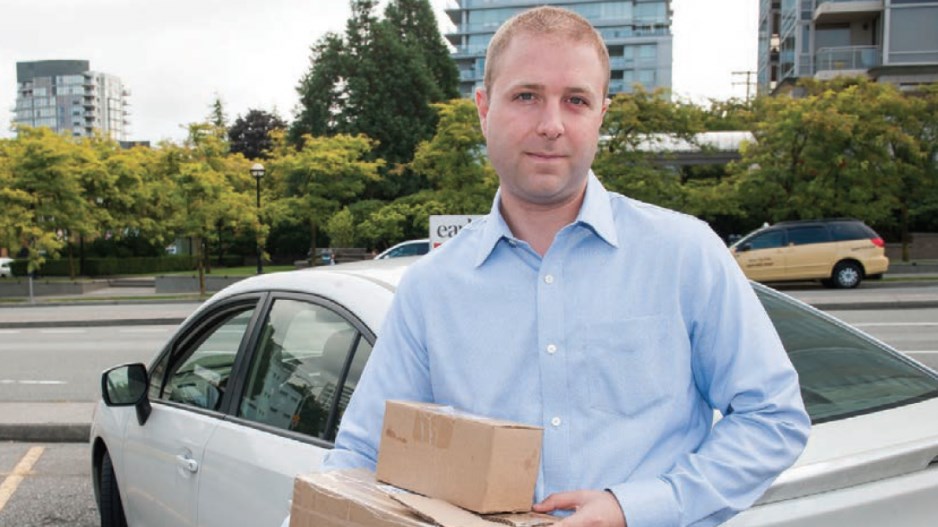Jeff Ingratta, a sales representative for a dental implant company, spends a lot of time in his car.
About six months ago he decided to pick up a second job that he could do during the down times in his workday. As a courier for Vancouver company Zipments.ca, he delivers packages, mostly from retailers to customers who have ordered items online.
“As I'm driving around the city to see customers, if the delivery is convenient and on my route, I'll pick it up,” Ingratta said. He earns between $6 and $18 per delivery.
Ingratta is part of the sharing economy, a business model that is growing in popularity around the world. While vacation rental company Airbnb (currently valued at $10 billion) and car service company Uber (valued at $17 billion) are the best-known examples, many other startups are attempting to gain a foothold in services such as home cleaning, moving and deliveries.
Rob Safrata, the owner of Vancouver courier company Novex Couriers, wanted in.
“A year and a half ago when I was watching what was happening with Uber, I said, ‘Well, this kind of thing applies to couriers as well,'” Safrata said.
In 2013, he licensed the Zipments app, which was developed by a U.S. company, and launched the service in Vancouver. Zipments.ca calls its casual deliverers “lifestyle couriers” and currently has 25 people signed up to do deliveries (300 people applied in the 48 hours after the service launched, Safrata said). The service uses Novex Couriers as backup.
Both sets of workers are independent contractors who get a cut of each delivery. The lifestyle couriers must cover the cost of insuring their car as a work vehicle and covering fuel and maintenance costs. While the same-day courier market, made up mostly of business-to-business deliveries, has seen little growth or change, Safrata hopes to tap into the growing market for same-day deliveries of online purchases.
Several retailers have already signed up, including Mountain Equipment Co-op and Purdy's Chocolates, and Safrata said he is currently working on deals with several large national retailers.
One advantage of the service is that casual deliverers are often most available during evenings and weekends, which is the most expensive time for professional courier services to deliver.
The sharing economy includes both for-profit models and non-profit ventures designed to bolster community and reduce waste, said David Van Seters, president of Sustainability Ventures and a champion of the idea.
Vancouver's Tool Library and Modo: The Car Co-op are examples of homegrown sharing endeavours. Van Seters is working with a Seattle startup called Stuffster, which allows consumers to track purchases with the aim of making it easier to sell or give away the item when it's no longer needed. He's also involved with a Victoria venture called ShareShack that would enable a neighbourhood to share equipment and tools.
While the sharing economy is growing in popularity in B.C., Van Seters said, it is still dominated by big companies that are headquartered elsewhere.
Handybook is one such company. With its head office in New York, the business now operates in 27 cities in North America, including Vancouver and Toronto.
Customers can use Handybook to hire home cleaners or handymen who have been screened and interviewed by the company. Customers rate the workers – who, like Uber drivers or Zipment deliverers, are considered self-employed contractors – after the job is done. Handybook collects 20% of the fee.
Handybook founder Oisin Hanrahan said the company has grown eightfold in the last seven months. It directly employs four people in Vancouver to administer the program.
Not everyone loves the sharing economy. In June, taxi drivers in several European cities protested what they said was unfair competition from Uber, which in many jurisdictions is not required to do business under the same regulations as taxis.
Uber stopped operating in Vancouver after a 2012 ruling from B.C.'s Passenger Transporation Board. The board determined Uber cars were the same as a limo service, meaning they would have to charge a minimum of $75 per ride. Vancouver's city council has expressed concerns about Airbnb's impact on hotels and rental supply and its compliance with safety and zoning regulations.
“Right now it feels like the Wild West of the sharing economy and there are some negative aspects,” Van Seters said. He believes municipalities need to be more proactive in introducing policies and bylaws to make the playing field level for everyone.
Safrata acknowledges the sharing economy model is disruptive.
“It can completely change an industry where the old way disappears,” he said.
Safrata has been working with the Insurance Corporation of British Columbia to develop a new form of insurance that will reduce costs for Zipment.ca's casual couriers. ICBC has been receptive to the idea, Safrata said. “That's why [the deliverers] can't just do one or two deliveries a day – they need to do enough to make it pay.




